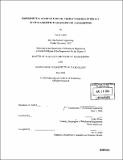Experimental study of lube oil characteristics in the PCV system and effects on engine oil consumption
Author(s)
Lopez, Oscar, 1980-
DownloadFull printable version (15.96Mb)
Other Contributors
Massachusetts Institute of Technology. Dept. of Mechanical Engineering.
Advisor
Victor Wong.
Terms of use
Metadata
Show full item recordAbstract
Engine oil consumption is an important source of hydrocarbon and particulate emissions in modem automobile engines. Great efforts have been made by automotive manufacturers to minimize the impact of oil consumption on engine emissions. Research engineers in the last decade have been trying to study the sources and driving mechanism of oil consumption. In contrast to oil consumption mechanisms in the piston-ring-liner system of the engine, the Positive Crankcase Ventilation (PCV) blowby-oil consumption mechanism has not yet been fully characterized. Studies have shown that the blowby contribution to oil consumption could be significant under certain conditions. In this study, an experimental approach was taken in order to study the sources and characteristics of oil in the PCV blowby gases at different speeds and loads. An extensive diagnostic system was successfully integrated in a production spark ignition engine, to measure total oil consumption, blowby oil consumption and flow and in-cylinder variables, such as inter-ring pressures, oil film thickness and liner temperatures. Results showed an increase in blowby oil consumption with load and speed. Blowby flow was mainly dependent on the load of the engine. Oil concentration in the blowby varied with engine operating conditions. A strong relationship was observed between oil consumption and sump oil level, showing that the oil in the crankcase is an important source of oil in the blowby. Moreover, extensive experiments were conducted to determine the blowby flow's oil characteristics, by varying the liner temperatures and analyzing the mass distribution of different oil particle size. It was found that the average oil droplet size decreased as the load and speed were increased. (cont.) This work is an important step in understanding blowby oil consumption in efforts to minimize oil consumption in spark ignition engines.
Description
Thesis (S.M.)--Massachusetts Institute of Technology, Dept. of Mechanical Engineering, 2004. Includes bibliographical references (p. 97-99).
Date issued
2004Department
Massachusetts Institute of Technology. Department of Mechanical EngineeringPublisher
Massachusetts Institute of Technology
Keywords
Mechanical Engineering.